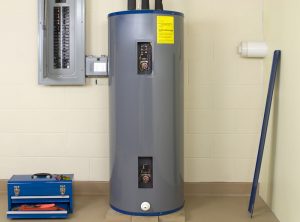 Knock-knock-knock. “The trick-or-treaters aren’t here yet, it’s too early for that, right?”
Knock-knock-knock. “The trick-or-treaters aren’t here yet, it’s too early for that, right?”
Knock-knock-knock. “Oh great, my house is haunted!”
While we can’t solve a haunted house, we can tell you that it’s probably not the cause of those knocking sounds you’re hearing. The knocking may be faint, and it could be otherwise easy to ignore if you just assume it’s coming from outside, but the truth is, it’s very likely coming from your water heater.
And no sound coming from your water heater should be ignored, especially not knocking! This type of sound can indicate issues that can accelerate faster, the longer you let it continue. Keep reading to learn more about what this sound may be and what you should do about it.
Scaling
The knocking sound you’re hearing your water heater make is very likely due to mineral deposits, AKA sediment, settling at the bottom of the water heater’s tank. This sediment is known as scale, and the sound comes from the reduced volume in the tank forcing steam bubbles to rise as the burners heat the tank The bubbles get trapped, and rattle around the sediment at the bottom of the tank, causing this knocking, popping, or rattling noise.
That’s not to say there couldn’t be another cause for the knocking sound you’re hearing—but the best thing you can do to make sure is call in a home services professional. Do be sure to before just assuming it’s something minor. Scaling can cause quite a bit of damage to your water heater tank, and may allow for quicker corrosion—meaning you’ll have to replace your water heater sooner than you expected to.
How Do Minerals Get Inside the Water Heater?
This is a great question that we get from homeowners. The mineral buildup, otherwise known as hard water, is comprised of an excess of calcium, magnesium, and sometimes iron. Hard water isn’t harmful to ingest—that is, it’s not harmful for your health. But it can cause some significant damage to your pipes and other plumbing components.
Mineral deposits get left behind in the bottom of the tank, which is made of metal and lined with glass. The deposits build up enough that they start rattling around and can wear down the glass lining of the tank, forcing corrosion. There’s no coming back from this once it happens—you will need to replace your water heater.
“What Can I Do?”
There are two things you can do in this case—one solves the problem and one prevents it altogether.
To solve the problem of scaling, you’ll want to have your water heater flushed. In fact, some water heaters need routine flushing throughout their lifespan, depending on the level of hard water in your home. Flushing successfully clears out any sediment that has gathered at the bottom of the tank.
This service is inherently a part of water heater maintenance—if you haven’t had your system maintained in the last year, now is the time! During maintenance, our technicians will make any necessary adjustments and look for signs of wear and tear so you can schedule service promptly.
But what if you could prevent scaling altogether? You can, by properly treating the hard water in your home. The installation of a whole-house water softener effectively replaces the hard water ions with sodium in order to protect your water heater tank, in addition to the rest of the plumbing in your home.
Trust Performance Plumbing for your professional plumbing in St. Peters, MO. Contact us today!
